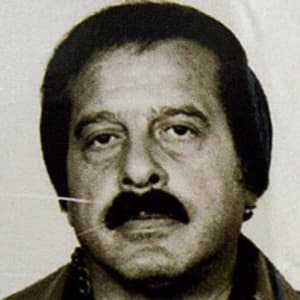Greg Scarpa, Sr., was born on May 8, 1928 near Venice, Italy and immigrated to the United States with his parents and brother Salvatore at a young age.
The 1950’s were a busy time for Scarpa. He married Connie Forrest and had four children, maintained a relationship with girlfriend Linda Schiro having two more children, and was introduced to the Colombo crime family by his brother Salvatore.
Scarpa was a successful gangster from the very beginning and it wasn’t long before he became heavily involved in illegal gambling, loansharking, extortion, hijacking, murder, assault, theft, and narcotics trafficking. As a gangster he wore stylish clothes and carried large amounts of cash in his pocket for purchases and bribery. He owned apartments and homes in Manhattan, Florida, Brooklyn, and Las Vegas. As his power grew his reputation for violence and murder grew as well eventually earning him the nickname “the Grim Reaper”. Shiro later said that Scarpa would sometimes leave the numbers “666” on his victim’s pagers.
In March 1962 law enforcement arrested Scarpa for armed robbery. If convicted he would serve a lengthy prison sentence which would certainly cripple his growing empire. As a high ranking member in the Colombo crime family the FBI provided Scarpa with a chance of freedom provided he was willing to give information to them from time to time regarding organized crime. He accepted and became an informant for the Federal Bureau of Investigation, a relationship that would last 30 years.

In the summer of 1964 three Mississippi Civil Rights workers were reported missing and suspected of being murdered by the Ku Klux Klan. According to Schiro and other sources, the FBI was having trouble finding their graves and recruited Scarpa to help locate them. At the time Scarpa was widely known as an aggressive mafioso and a formidable interrogator. The FBI used Scarpa and his skills to kidnap a TV salesman and known Klansman named Lawrence Byrd who is suspected of having information on the three workers. Scarpa and FBI agents took Byrd to Camp Shelby a local Army base where they severely beat him until he revealed the location of the civil rights workers graves.The FBI never officially confirmed Schiro’s account of the story. Instead investigative journalist Jerry Mitchell and another man claimed a Mississippi highway patrolman named Maynard King provided the grave locations after receiving a tip from an anonymous third party.
Scarpa was eventually dropped as a confidential informant by the FBI in January1966, but their relationship was renewed in 1980 when FBI agent Lindley DeVecchio approached Scarpa and convinced him to cooperate again.
DeVecchio and Scarpa had a tight relationship that some say involved numerous illegal dealings of cash, jewelry, and gifts. In return DeVecchio provided Scarpa with information about his enemies during the third Colombo war and likely saved his life in the process. The two worked together for over 10 years often meeting alone in apartments or hotels provided by the FBI where they would exchange information. In one such meeting Scarpa gave DeVecchio a hard-to-find Cabbage Patch doll for his daughter just in time for Christmas.
Scarpa was arrested in 1985 and charged with running a major credit card scam. He pled guilty and was awaiting sentence when DeVecchio submitted a memo to the judge that listed all of Scarpa’s contributions to the FBI. Scarpa was eventually sentenced to five years probation with no prison time and a $10,000 fine. He may have gotten off lightly, however some of the Colombo soldiers were surprised at the leniency of the court and suspected Scarpa might have a relationship with the government.
In 1991 the Colombo family was involved in a power struggle. On one was side Colombo boss Carmine Persico and the other, acting boss Victor Orena. During the war Persico loyalist unsuccessfully attempted to murder Orena. Instead of retaliating against the highly protected Persico, Orena sent his men to murder Scarpa who a staunch Persico allie.
November 18, 1991 hitmen converged on Scarpa’s vehicle with guns drawn, but Scarpa managed to drive away before any shots were fired. Scarpa was infuriated at the attempt on his life and over the next several months traveled through Brooklyn looking for Orena loyalists in social clubs and bars. At the end of the war Orena supporters Rosario Nastasa, Vincent Fusaro and James Malpiso were dead. Malpiso was gunned down while hanging Christmas lights on his home.
In 1992 Scarpa, who is in poor health after contracting the AIDS virus from tainted blood, was arrested for violating state firearms laws and indicted on federal racketeering charges involving three murders. He was placed under house arrest awaiting trial.

On December 29, 1992 Lucchese crime family gangsters Michael DeRosa and Ronald Moran threatened Scarpa’s stepson Joey over a drug deal. Although he was in poor health Scarpa climbed out of bed and drove with Joey to DeRosa’s house to confront the two men. Fearing for their lives a gunfight erupted and DeRosa was shot twice in the chest and Scarpa was shot once in the eye. After arriving at the hospital prosecutors revoked Scarpa’s house arrest and send him to jail.
On May 6, 1993 Scarpa pled guilty to three murders and conspiracy to commit murder. In frail health and blind in one eye he was sentenced to life in prison on December 15, 1993, but the sentence was reduced to 10 years due to his poor health. He died on June 4, 1994 in the Federal Medical Center for prisoners in Rochester Minnesota.
